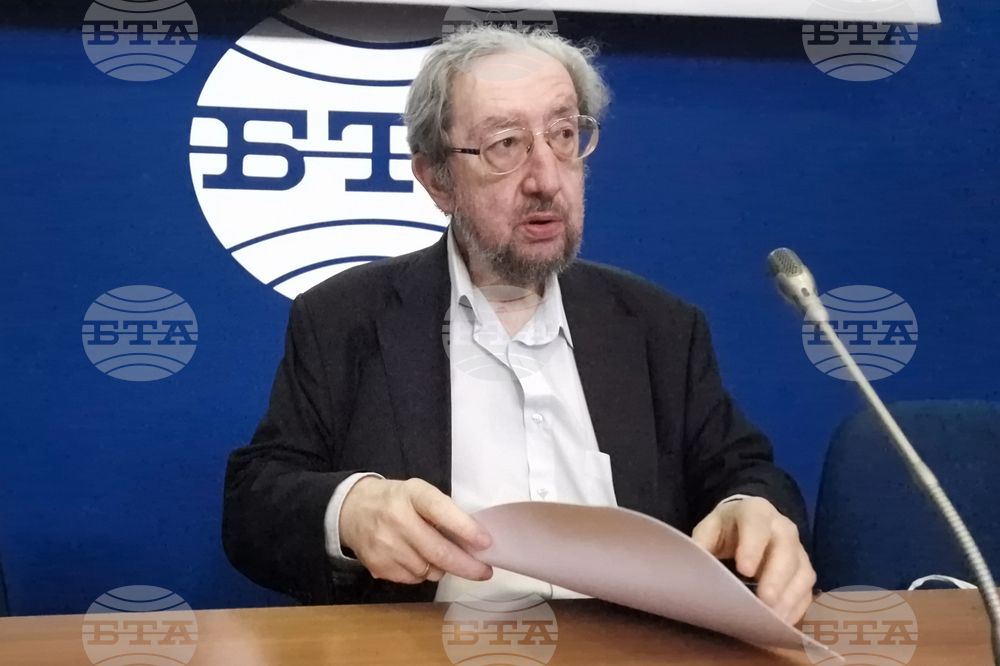site.btaSix Parties Most Likely to Enter Parliament - Poll


At this stage, a six-party parliament is most likely, with an option for a seventh party, according to the latest poll by the Centre for Analysis and Marketing presented at the BTA National Press Club on Thursday.
The poll was conducted between May 31 and June 4, 2024, among 821 adult citizens of Bulgaria, using a direct standardized face-to-face interview.
If the parliamentary elections are today, the difference between the possible first and second political forces will be a little less than 10%, the poll shows, GERB - UDF being the winner and Continue the Change-Democratic Bulgaria (CC-DB) being the runner-up.
Here is how the parties and coalitions are expected to do in the national election according to this poll:
GERB-UDF - 26.4% of the possible voters, 70-76 members of parliament (MPs);
CC-DB - 16.%, 43-49 MPs;
Movement for Rights and Freedoms (MRF) - 15%, 40-44 MPs;
Vazrazhdane - 14.5%, 38-42 MPs;
BSP for Bulgaria - 8.4%, 21-25 MPs;
There Is Such a People - 5.3%, 13-17 MPs;
4.2% of respondents will not support anyone.
Bulgarian Solidarity Coalition is below the 4% threshold for entry into the National Assembly but still have a chance to win seats, said Yuli Pavlov, the director of Centre for Analysis and Marketing.
Blue Bulgaria Coalition is unlikely to clear the 4% barrier but it is also not excluded. So far, 2.4% of the possible voters would support them.
Asked whether the new parliament will be able to elect a regular cabinet, 33.7% of all eligible voters and 51.4% of possible voters answered “yes”. 46.9% and 35.2%, respectively, gave a negative answer. 19.4% and 13.4%, respectively, were undecided.
As many as 32.6% of all eligible voters and 37.8% of possible voters said that a cabinet supported by GERB-UDF and CC-DB would be a better option than not electing a government. 36.5% and 39.4%, respectively, prefer another early election.
“From what we see so far, it will be difficult to get a coalition between the first two political forces in the next Parliament to govern the country”, Pavlov said. According to him, the task of electing a two-party government will be even more difficult if there is a 7th political party in the legislature. "In both cases there will have to be a third formation in the government," he added.
“After these elections it will most likely be more difficult to form a government. The MRF will have to be an official partner rather than having a supporting role, and that will create problems for the CC-DB”, Yuli Pavlov said.
Pavlov argued that the weight of bought votes on the electoral results is highly overestimated.
The survey shows that between 2.5-2.7 million people are expected to vote in the early parliamentary elections on June 9, which is less than 40% of the people in the voter registers. There will be fewer voters for the European elections, especially given that Bulgarians living in Turkiye do not have the right to vote for European Parliament.
Here is how the parties and coalitions are expected to do in the European elections according to this poll:
GERB-UDF - 26.2% of the possible voters, 5 possible Members of European Parliament (MEPs);
CC-DB - 17.7%, 3-4 MEPs;
Vazrazhdane - 14.8%, 3 MEPs;
Movement for Rights and Freedoms (MRF) - 14.1%, 3 MEPs;
BSP for Bulgaria - 8.1%, 2 MEPs;
There Is Such a People - 5.3%, 1 MEP.
Most of the leading politicians in Bulgaria have an approval rating below 20%, Pavlov said. In his words, there is no politician who has a positive rating and disapproval is higher than approval for all of them.
Here are the personal approval ratings of this country's leaders and politicians:
President Rumen Radev gets the highest approval rating, 42.6%, but disapproval is higher, at 44.1%;
Vice President Iliana Iotova - 37.1% approval and 49.3% disapproval;
Caretaker Prime Minister Dimitar Glavchev - 18.3% approval, 65.2% disapproval;
GERB leader Boyko Borissov - 24.3% approval, 69.2% disapproval;
CC-DB co-leader Kiril Petkov - 18.7 % approval , 73.4% disapproval;
CC-DB co-leader Assen Vassilev -17.3% approval, 78.5% disapproval;
Vazrazhdane leader Kostadin Kostadinov - 18.1% approval, 77.2% disapproval;
One of the two chairpersons of MRF, Delyan Peevski - 7.5% approval, 84.8% disapproval;
One of the two chairpersons of MRF, Dzhevdet Chakarov - 7.5% approval, 73.3 disapproval;
Bulgarian Socialist Party (BSP) leader Korneliya Ninova - 13% approval, 74.4% disapproval;
There Is Such a People (TISP) leader Slavi Trifonov 15.2% approval, 69.7% disapproval.
Institutional approval
Only the Bulgarian Armed Forces has positive approval rating, 52%, and the disapproval is 36.7%;
Disapproval is highest in the prosecution service and Parliament, at 72.5% and 72.4%, respectively, with approval a mere 14.3% and 14.8%, respectively;
The police are approved by 37% of respondents and disapproved by 47.3%.
Asked how the Nikolay Denkov government had fared, 27.5% found it successful and 68.2% unsuccessful. Asked to assess the perforamance of the caretaker Government of Dimitar Glavchev, 20.3% said it is "rather successful" and 48.5% "rather unsuccessful". The largest group of respondents (23.8%) believe that CC-DB bears the main responsibility for the failed government rotation between GERB-UDF and CC-DB, and 17.3% blame GERB-UDF for that.
Among the country's serious problems, respondents most often mentioned corruption in judicial reform and poor governance.
/NF/
news.modal.header
news.modal.text